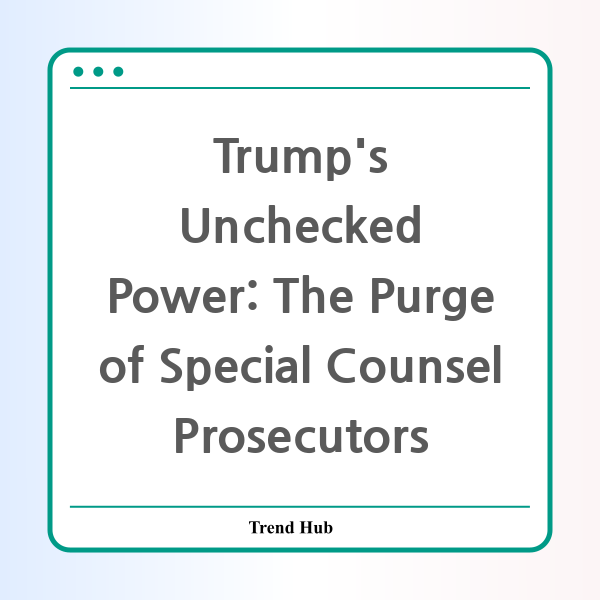* This website participates in the Amazon Affiliate Program and earns from qualifying purchases.

In a dramatic turn of events, the power dynamics within the U.S. justice system have shifted as former President Donald Trump has personally ordered the firings of several special counsel prosecutors. This unprecedented move raises critical questions about the balance of power between the presidency and the judiciary, and what it means for the future of law enforcement in America.
Reports indicate that Trump’s directive to eliminate members of special counsel Jack Smith’s team originated directly from the Oval Office, showcasing a bold display of authority. The acting attorney general, James McHenry, ostensibly took the formal step of notifying the prosecutors of their termination, describing them as individuals who could not be trusted to further Trump’s political agenda. However, sources reveal that the real impetus came from Trump himself, indicating a new phase in which the justice department operates under the direct influence of the executive branch.
This intervention illustrates Trump's vision of a unitary executive model where the president has the power to direct all government agencies to align with his specific objectives. The removal of these prosecutors—who were actively involved in cases against Trump—marks what some advisors see as the beginning of a broader strategy to reshape the Department of Justice (DOJ) to ensure loyalty and compliance with presidential directives.
As the firings unfold, the repercussions are multifold. Firstly, the abrupt dismissal of these career prosecutors—who are well-versed in legal processes and civil service protections—points to a willingness to prioritize political loyalty over professional integrity. This move could create an atmosphere of fear within the DOJ, where attorneys may feel pressured to align their work with the preferences of the administration rather than adhere to the principles of justice and impartiality.
In the days following Trump's orders, significant shifts have been observed in key divisions of the DOJ, including the criminal, civil, and national security sectors. High-ranking officials have already been ousted, and there are expectations that the vacancies will be filled by individuals who are loyal to Trump’s agenda. Such changes could alter the future legal ideology of the department and potentially lead to a shift in how justice is administered across the country.
Looking ahead, the implications of these firings extend beyond personnel changes. The recently fired prosecutors are bracing for intense scrutiny as they are likely to be subject to politically charged investigations. The climate in Washington is already fraught with tension, and this latest development only heightens the stakes.
Furthermore, Trump has signed an executive order directing the attorney general to compile a report on the so-called “weaponization of the federal government.” This report is expected to delve into the very cases from which these special counsel prosecutors have been dismissed, potentially amplifying the politicization of the justice system.
The Trump administration’s attempts to consolidate power within the DOJ signal a troubling trend that could lead to the erosion of checks and balances. The push to align the department with the president’s agenda poses fundamental questions regarding accountability and the rule of law in a democratic society. As this story continues to unfold, the legal community and the American public alike will be watching closely to see how these changes impact justice and governance in the United States.
* This website participates in the Amazon Affiliate Program and earns from qualifying purchases.